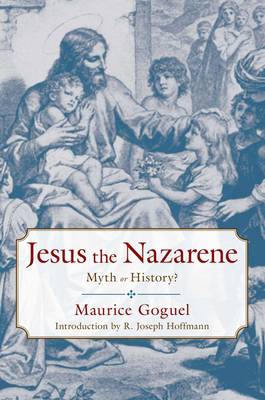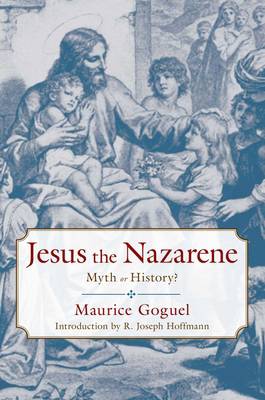
- Retrait gratuit dans votre magasin Club
- 7.000.000 titres dans notre catalogue
- Payer en toute sécurité
- Toujours un magasin près de chez vous
- Retrait gratuit dans votre magasin Club
- 7.000.0000 titres dans notre catalogue
- Payer en toute sécurité
- Toujours un magasin près de chez vous
Description
Originally published in 1926, this classic investigation into the question of the historicity of Jesus by Maurice Goguel, Professor of New Testament Criticism at the University of Paris, is considered one of the most important rebuttals of the "Myth Theory" of Christian origins. Advocated by a number of scholars in Europe and America, the theory maintained that Christianity evolved as an amalgam of salvation myths in circulation during the early centuries of the Roman Empire. The corollary of the theory is that the historical Jesus never existed.
Goguel first examines the meager non-Christian evidence from antiquity that attests to the existence of Christianity -- i.e., in the works of Tacitus, Pliny, and Josephus, among others. Based on a statement about Christians in the Annals of Tacitus, Goguel is convinced that Tacitus knew of a document that "connected Christianity with the Christ crucified by Pontius Pilate."
He then devotes considerable attention to the letters of Paul, pointing out many points of historical reference in Paul that make it highly probable that Jesus was an actual religious leader. In particular he notes the sometimes-contentious relation between Paul and James, the brother of Jesus, as well as Jesus' apostles. He asks why such details of conflict and disharmony among early Christians would be preserved in accounts that were completely fabricated.
Finally, he examines the four gospels. While recognizing their inadequacy as reliable historical accounts and the implausibility of reports of miracles in them, he argues that claims of miraculous power were commonplace in describing extraordinary persons in antiquity, including Roman emperors and heroes. Goguel's analysis is especially important because he applies a thoroughly rationalist critique to the gospels without suggesting that the historical core of the story is negated by the fabulous and mythological details that give it context.
This classic text is essential reading for anyone interested in the modern quest for the historical Jesus.
Goguel first examines the meager non-Christian evidence from antiquity that attests to the existence of Christianity -- i.e., in the works of Tacitus, Pliny, and Josephus, among others. Based on a statement about Christians in the Annals of Tacitus, Goguel is convinced that Tacitus knew of a document that "connected Christianity with the Christ crucified by Pontius Pilate."
He then devotes considerable attention to the letters of Paul, pointing out many points of historical reference in Paul that make it highly probable that Jesus was an actual religious leader. In particular he notes the sometimes-contentious relation between Paul and James, the brother of Jesus, as well as Jesus' apostles. He asks why such details of conflict and disharmony among early Christians would be preserved in accounts that were completely fabricated.
Finally, he examines the four gospels. While recognizing their inadequacy as reliable historical accounts and the implausibility of reports of miracles in them, he argues that claims of miraculous power were commonplace in describing extraordinary persons in antiquity, including Roman emperors and heroes. Goguel's analysis is especially important because he applies a thoroughly rationalist critique to the gospels without suggesting that the historical core of the story is negated by the fabulous and mythological details that give it context.
This classic text is essential reading for anyone interested in the modern quest for the historical Jesus.
Spécifications
Parties prenantes
- Auteur(s) :
- Traducteur(s):
- Editeur:
Contenu
- Nombre de pages :
- 319
- Langue:
- Anglais
Caractéristiques
- EAN:
- 9781591023708
- Date de parution :
- 01-04-06
- Format:
- Livre broché
- Format numérique:
- Trade paperback (VS)
- Dimensions :
- 155 mm x 230 mm
- Poids :
- 417 g

Les avis
Nous publions uniquement les avis qui respectent les conditions requises. Consultez nos conditions pour les avis.






